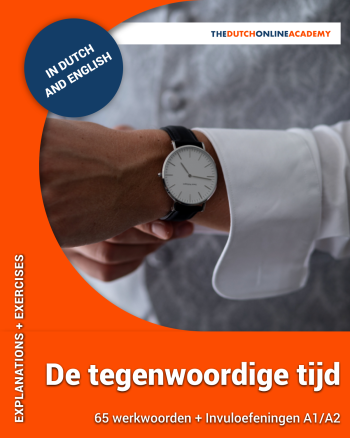Learn the theory
What is the difference between de and het in Dutch?
'Het' is for neuter nouns.
'De' for masculine and feminine nouns.
Although there are some rules, for non-native speakers it more or less comes down to learning 'het' and 'de' words one by one.
Important rules:
- Plural nouns = de
- Verkleinwoorden/diminutive nouns = het
- Noun made from infinitive verb = het
- Nouns for persons with identified gender = de (so 'de dochter' (the daughter), but 'het kind' (the child))
- Nouns for professions = de
- Letters and numbers = de
- Nouns for languages = het
- Two syllable nouns starting with ge-/be-/ver-/ont- = het
- Words ending in -isme/-ment/-sel/-um = het-
- Metals = het
- Fruits, trees, plants = de- words ending in -ing/-ij/-heid/-nis/-de/-te = de
- Words with a foreign origin ending in -ade/-ide/-ode/-ude/-age/-esse/-ica/-iek/-ie/-ine/-iteit/-ose/-sis/-suur/-ys
- Words/Names of rivers and mountains = de
Some of these rules have exceptions and there are lots of words that can't be clearly defined by any rule. You'll have to learn them by heart. The best way would probably be regular practice and trying to memorise it as soon as you learn the noun.
There are more 'de' words than 'het' words. Some Dutch learners like to view 'het' words as special words and memorise these. They use 'de' for all the others. Here you'll find a list with common HET-words. For some words both 'het' and 'de' are fine (like het/de doolhof (the maze)), although this sometimes leads to a different meaning of the word (de/het aas (the ace / the bait)).
Do you want to improve your Dutch further? We offer grammar explanations, Dutch lessons and Dutch grammar exercises.
De and Het in Dutch: important and not so important
Most students who start learning Dutch are staggered by the difficulty to remember DE and HET words. As a Dutch teacher, I would advice them to not focus on this topic too much. Making a mistake with DE or HET doesn't hinder the conversation. Your message will be clear. And at the start there is so much to learn, that using DE and HET perfectly shouldn't have priority.
On the other hand it is important to know that DE and HET have a huge influence on Dutch language and it is handy to learn them along the way. Their influence goes further than just being articles in front of a noun.
DE and HET influence the following aspects of the Dutch language:
- Forming adjectives
- The use of pronouns
- Forming the Relative clause
So, don't worry too much if you make DE and HET mistakes (that's part of the process), but do know that they influence the language in many ways. Just try to learn them one by one during your Dutch journey.
Practice with exercises
Pick the right article: de or het. Check the rules in the article to decide and remember: plural = de, diminutive = het, plural diminutive = de.
comments
Login to leave a comment


